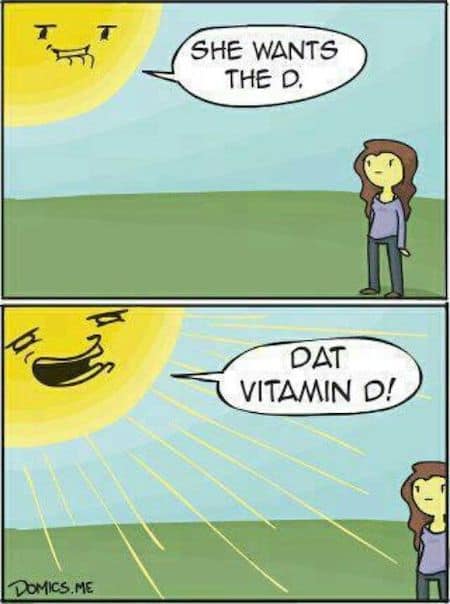According to a 2011 study, over 40% of adults experience vitamin D insufficiency. This may result from lifestyle habits or environmental factors. Regardless, this “sunshine” vitamin is an essential nutrient that needs to be prioritized.
So, what's vitamin D?
Keep reading this article to learn a brief overview of vitamin D, the benefits of vitamin D, and how to incorporate vitamin D into the lifestyle.

What's Vitamin D?
First things first, what is vitamin D? Vitamin D like vitamins A, K, and E, is a fat-soluble vitamin. Fat-soluble vitamins dissolve in fat and get stored in the body's tissue.
Vitamin D comes from animal protein and plants.
However, the body naturally produces this vitamin from the sun. Exposure to sunlight, or UV rays, interacts with a chemical in the skin. The chemical transforms into vitamin D, which can then be used by the body to provide various health benefits.
What Does Vitamin D Do?
Vitamin D's primary job is to regulate the levels of calcium and phosphorus in the body.
Although most associate calcium with strong bones and teeth, this nutrient has other purposes, too. Calcium is required for muscle movement. Additionally, calcium assists nerve and brain communication, as well as the release of hormones.
Like calcium, Phosphorus plays a role in maintaining strong bones and teeth. However, it also helps the body make energy.
Vitamin D helps the body absorb the proper amounts of calcium and phosphorus.
Benefits of Vitamin D
Vitamin D benefits include the benefits of having calcium and phosphorus in the body.
Without vitamin D, calcium won't get absorbed and can cause the bones to become weak and brittle. Brittle bones are more susceptible to breaks and fractures. Vitamin D reduces the risk of osteoporosis, which is the age-related thinning of the bones.
Similarly, vitamin D reduces instances of bone and muscle pain.
Calcium contributes to the movement of our muscles, like the heart and blood vessels. Too much, or too little, calcium can cause an irregular or erratic heartbeat. This can lead to blood clots, stroke, and heart failure.
Therefore, vitamin D can lower blood pressure and reduce the risk of cardiovascular disease.
Vitamin D also promotes a healthy immune system. It strengthens immune cells which protect us from common infections like the flu. Similarly, it may lower the risk of developing various autoimmune diseases.
Lastly, vitamin D may help to regulate the mood, reducing instances of anxiety and depression.
Sources of Vitamin D
One of the easiest ways to get vitamin D is to spend time outdoors. However, the strength of UV rays varies depending on location. Your living environment may not provide enough sun exposure.
Thankfully, there are other methods of obtaining vitamin D.
Vitamin D can come from food such as fatty fish, egg yolks, mushrooms, and certain dairy products.
Alternatively, you can take vitamin D tablets. These are easy to incorporate into the diet. With these supplements, you can be sure that you're receiving the right amount of vitamin D.
Look To the Sunlight
So, what's vitamin D? A vitamin that promotes health and well-being. Whether you obtain it via sunlight, food, or supplements, it is an essential nutrient that needs to be incorporated into your lifestyle.
For other helpful health and fitness information, explore the rest of our site!
